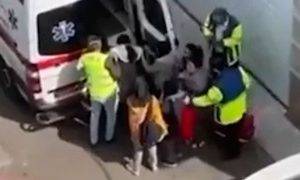
Iran has experienced a spike in suspected poisoning attacks at girls’ schools across the country in recent days, according to state and semi-official media, as medical staff and teachers accused government officials of attempting to silence the victims.
Iran has seen a wave of suspected poisoning attacks, almost entirely at girls’ schools, since late November. The so-far unexplained illnesses have affected hundreds of schoolgirls, with many hospitalized.
Saturday is believed to be the worst day yet, with incidents reported at dozens of schools. Social media video showed schoolgirls being escorted to ambulances and using oxygen canisters at locations across the country. CNN was able to verify dozens of these new incidents, using video and witness testimony, across 10 provinces.
On Monday, Iran’s Supreme Leader Ali Khamenei called the suspected poisonings an “unforgivable crime,” calling for “severe punishment” for anyone found responsible. As of last Wednesday, no one had been arrested in connection with the incidents, according to Interior Minister Ahmad Vahidi.
“This is a big and unforgivable crime. If it is proven that the students were poisoned, the perpetrators of this crime should be severely punished. There will be no amnesty for these people,” Khamenei said on the sidelines of a tree-planting event in Tehran, according to official news agency IRNA.
In the southeastern Khuzestan province, the number of suspected poisonings totaled nearly 700 patients on Sunday, according to state media outlet ISNA, citing the Vice President of Ahvaz University of Medical Science, Habib Haibar.
Many of the reports and videos posted to social media were recorded Saturday, the start of Iran’s five-day work and school week, which runs from Saturday to Wednesday.
In a statement carried by the state-aligned Tasnim news agency on Saturday, Vahidi said “suspicious substances” had been identified in connection with the incidents.
“During field investigations by the relevant bodies, suspicious samples have been found, which are being examined at laboratories in order to identify the causes of complications in students,” Vahidi said.
“Results will be announced as soon as possible by the Ministry of Health,” he added.
Vahidi also emphasized that the government’s main priority is the health of students, according to Tasnim.
Speculation has swirled among Iranian lawmakers as the spate of suspected attacks dominates headlines. On Friday, Iran’s hardline President Ebrahim Raisi blamed the incident on “enemies of Iran” who, he said, aimed to stoke unrest in the country.
“Recently, the enemies who have been orchestrating and waging media and psychological warfare in Iran seek to weaken Iran’s security hoping to create an atmosphere of despair by fomenting insecurity and apprehension in the Iranian society,” Raisi said in a statement about the suspected poisoning attacks.
Raisi did not directly specify who the “enemies” were, although Tehran habitually accuses the United States and Israel of acting against it.
Iranian Foreign Minister Hossein Amir-Abdollahian on Friday criticized Western governments for “shedding crocodile tears” over the poisonings.
Both the US and United Nations have called on the Iranian authorities to fully investigate the suspected poisonings and hold those responsible accountable.
Meanwhile, parents of the victims have staged protests over the poisoning incidents, in scenes reminiscent of the start of a nationwide uprising that erupted last September over the death of Mahsa Amini. The 22-year-old Kurdish-Iranian woman died after being detained by Iran’s “morality police” and taken to a “re-education center,” allegedly for not abiding by the country’s conservative dress code.
Security forces reportedly fired tear gas at demonstrations on Sunday in the capital, Tehran. Social media video showed security forces dispersing the protests.
CNN spoke with four medical sources who treated the students who were believed to have been poisoned, one teacher from an affected school and four parents of the victims, who all claimed they were pressured not to speak about the issue.
One doctor who has treated several of the students affected told CNN he believed his phone was being monitored. He and three other medical sources said hospital administrators ordered them to refrain from speaking in public about the issue in what they described as a silencing campaign orchestrated by the government.
On Sunday, social media video showed multiple schoolgirls receiving medical attention at Yazd hospital, in central Iran.
“The private school was attacked by gas. All the children have difficulty breathing,” said the woman filming the video. “This is our country. They don’t even know what they are doing.”
Source – CNN

